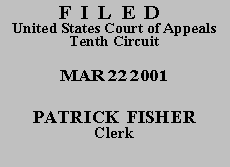

| LATASHA CONLEY TURNER,
Plaintiff-Appellant, v. AMERICAN RED CROSS TISSUE SERVICES, Southern Plains Area, Defendant-Appellee. |
|
Appellant Latasha Conley Turner appeals from a jury verdict in favor of the defendant and from denial of her motion for new trial in her employment discrimination action brought pursuant to Title VII of the Civil Rights Act of 1964, as amended, 42 U.S.C. § 2000e-17. Our jurisdiction arises under 28 U.S.C. § 1291, and we affirm.
Ms. Turner's appeals are based on her contention that the district court erred in giving two jury instructions that allegedly do not accurately state the law of racial discrimination in a failure-to-promote case brought under Title VII. "[W]e review de novo the question of whether the court's instructions, considered as a whole, properly state the applicable law and focus the jury on the relevant inquiry." Thomas v. Denny's, Inc., 111 F.3d 1506, 1509 (10th Cir. 1997) (quotation omitted). The first challenged instruction, number 12, stated, in pertinent part:
In order for plaintiff to prevail on her race discrimination claim, she must prove by a preponderance of the evidence:
First: That she was a member of a protected class;
Second: That she was qualified for the positions in question;
Third: That she was rejected for the positions in question; and
Fourth: That her race was a motivating factor in defendant's employment decision.
Appellant's App. Vol. I at 70. Citing McDonnell Douglas Corp. v. Green, 411 U.S.792, 802 (1973), and Thomas, 111 F.3d at 1510, Ms. Turner argues that the instruction does not reflect the elements necessary to establish a prima facie case of race discrimination based on failure to promote.
Ms. Turner, however, ignores the principle that
the presumption and burdens inherent in the McDonnell Douglas formulation drop out of consideration when the case is submitted to the jury on the merits. As the Supreme Court noted in United States Postal Serv. Bd. of Governors v. Aikens, 460 U.S. 711, 713-14, 103 S. Ct. 1478, 1480-81, 75 L.Ed.2d 403 (1983), the important issue is discrimination vel non not the orderly presentation of evidence.
Messina v. Kroblin Transp. Sys., Inc., 903 F.2d 1306, 1308 (10th Cir. 1990). Although in Thomas we referenced a plaintiff's prima facie burden under McDonnell Douglas when discussing the propriety of a jury instruction, see 111 F.3d at 1509-10, the issue there was whether the court properly instructed the jury on the plaintiff's burden to show that he was qualified for the position. Id. at 1510. The district court in Thomas had instructed the jury that the plaintiff had to prove that he was "at least as well qualified for the position as the person hired" before the jury could consider whether the reasons the defendant had given for not promoting the plaintiff were pretextual. See id. at 1511. This error was not repeated in the case at bar. Instead, the district court properly instructed the jury on the plaintiff's burden to show that she was qualified for the position and on her ultimate burden of establishing that defendant intentionally discriminated against her because of her race. See St. Mary's Honor Ctr. v. Hicks, 509 U.S. 502, 511 (1993).
We also reject Ms. Turner's claim that instruction number 12 misled the jury to believe that discrimination could be proved only by direct, as opposed to circumstantial, evidence. Instruction number 12 does not refer to the types of evidence that may satisfy a plaintiff's burden. Instruction number 13, however, specifically instructed the jury that the plaintiff was "not required to produce direct evidence of an unlawful motive, or to prove that the reasons given by defendant are false." Appellant's App. Vol. I at 73. Instruction number 13 also instructed the jury that
[i]f you find that the stated reasons given by defendant are inconsistent or implausible or that defendant substantially deviated from its own practices or policies, then you may conclude that the offered explanation is a mere pretext, excuse, sham, or cover-up for discrimination. If you find pretext, you may also infer that race was a motivating factor in the employment decisions, though you are not required to draw such an inference.
Id. at 72. Thus the district court specifically instructed the jury that it could find discrimination through circumstantial evidence.
Similarly, Ms. Turner's claim that jury instruction number 13 is erroneous and prejudicial to her because it does not make "reference to evidence of pretext for which the jury can infer discrimination" and is not tailored "to fit the facts of the case," Appellant's Br. at 20, is also without merit. We approved a similar instruction in Mason v. Oklahoma Turnpike Authority, 115 F.3d 1442, 1454-55 (10th Cir. 1997). Although the instruction is not as detailed as the instruction Ms. Turner requested, it properly instructed the jury on types of circumstantial evidence related to the case that may establish pretext. Cf. F.D.I.C. v. Schuchmann, 235 F.3d 1217, 1222 (10th Cir. 2000) ("[i]t is not error to refuse to give a requested instruction if the same subject matter is adequately covered in the general instructions") (quotation omitted).
The judgment of the United States District Court for the Western District of Oklahoma is AFFIRMED.
ENTERED FOR THE COURT
PER CURIAM
*. This order and judgment is not binding precedent, except under the doctrines of law of the case, res judicata, and collateral estoppel. The court generally disfavors the citation of orders and judgments; nevertheless, an order and judgment may be cited under the terms and conditions of 10th Cir. R. 36.3.